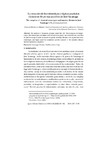Please use this identifier to cite or link to this item:
https://accedacris.ulpgc.es/jspui/handle/10553/74591
| DC Field | Value | Language |
|---|---|---|
| dc.contributor.author | Rodríguez Herrera, Gregorio | en_US |
| dc.date.accessioned | 2020-09-28T18:50:01Z | - |
| dc.date.available | 2020-09-28T18:50:01Z | - |
| dc.date.issued | 2020 | en_US |
| dc.identifier.issn | 0874-5498 | en_US |
| dc.identifier.other | Scopus | - |
| dc.identifier.uri | https://accedacris.ulpgc.es/handle/10553/74591 | - |
| dc.description.abstract | The analysis of the poems grouped under the title "Nesta esquina do tempo" shows that stereotypes and topics used in Latin love poetry are subverted and rewritten by José Saramago in order to render his poetic intention. Besides, it is argued that these stereotypes and topics must be considered another element of the inherited literary tradition present in his poetry. | en_US |
| dc.description.abstract | Neste artigo, analisamos o bloco de poemas intitulado "Nesta esquina do tempo" de Os poemas possíveis para mostrar que os estereótipos e tópicos da poesia erótica greco-latina são reescritos e subvertidos por José Saramago de modo a canalizar sua intenção poética. Da mesma forma, estabelecemos que aqueles devem ser considerados como outro elemento da tradição literária herdada presente em sua poesia. | en_US |
| dc.language | spa | en_US |
| dc.relation.ispartof | Agora - Estudos Classicos em Debate | en_US |
| dc.source | Agora - Estudos Classicos em Debate [ISSN 0874-5498], v. 22, p. 287-302, (Enero 2020) | en_US |
| dc.subject | 6202 Teoría, análisis y crítica literarias | en_US |
| dc.subject.other | Classical Tradition | en_US |
| dc.subject.other | Latin Elegy | en_US |
| dc.subject.other | Saramago, José (1922-2010) | en_US |
| dc.subject.other | Tradição clássica | en_US |
| dc.subject.other | Elegia latina | en_US |
| dc.title | La recepción de los estereotipos y tópicos amatorios clásicos en Os poemas possíveis de José Saramago | en_US |
| dc.title.alternative | The reception of classical stereotypes and amatory themes in José Saramago's Os poemas possíveis | en_US |
| dc.type | info:eu-repo/semantics/article | en_US |
| dc.type | Article | en_US |
| dc.identifier.doi | 10.34624/agora.v0i22.14200 | en_US |
| dc.identifier.scopus | 85091031200 | - |
| dc.contributor.authorscopusid | 26037984400 | - |
| dc.description.lastpage | 302 | en_US |
| dc.description.firstpage | 287 | en_US |
| dc.relation.volume | 22 | en_US |
| dc.investigacion | Artes y Humanidades | en_US |
| dc.type2 | Artículo | en_US |
| dc.utils.revision | Sí | en_US |
| dc.date.coverdate | Enero 2020 | en_US |
| dc.identifier.ulpgc | Sí | es |
| dc.description.sjr | 0,111 | |
| dc.description.sjrq | Q2 | |
| dc.description.ahci | AHCI | |
| dc.description.erihplus | ERIH PLUS | |
| item.grantfulltext | open | - |
| item.fulltext | Con texto completo | - |
| crisitem.author.dept | GIR IATEXT: Filología Clásica "Juan de Iriarte" | - |
| crisitem.author.dept | IU de Análisis y Aplicaciones Textuales | - |
| crisitem.author.dept | Departamento de Filología Hispánica, Clásica y de Estudios Árabes y Orientales | - |
| crisitem.author.orcid | 0000-0002-9856-8897 | - |
| crisitem.author.parentorg | IU de Análisis y Aplicaciones Textuales | - |
| crisitem.author.fullName | Rodríguez Herrera, Gregorio | - |
| Appears in Collections: | Artículos | |
Page view(s)
92
checked on Jan 10, 2026
Download(s)
53
checked on Jan 10, 2026
Google ScholarTM
Check
Altmetric
Share
Export metadata
Items in accedaCRIS are protected by copyright, with all rights reserved, unless otherwise indicated.
